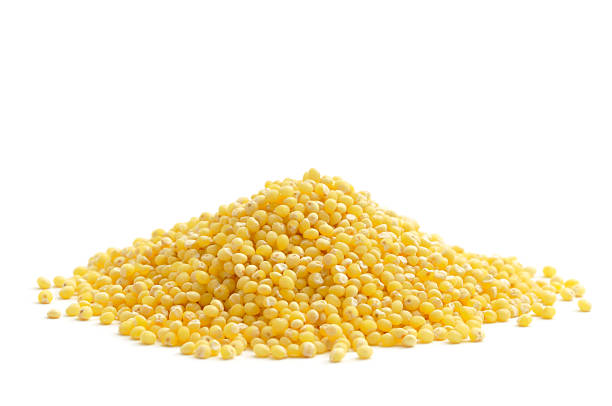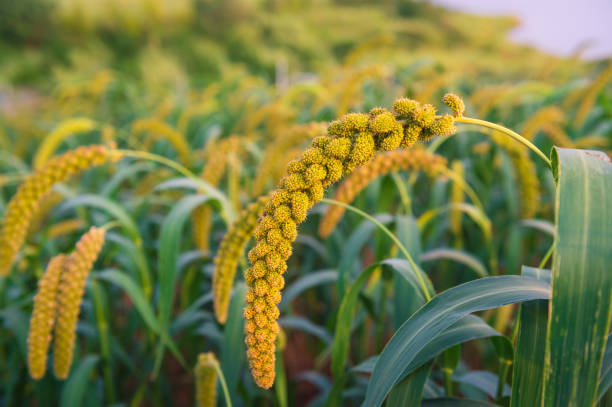For those of us who are very conscious about our health, we add foods that are healthy for our body and avoid those that are not. Millet is one of the superfoods that is very beneficial for our health. Millet is heart-healthy, helpful for diabetic patients, and also useful for those who have a gluten intolerance and cannot eat bread or flour. Millet is a grain and is related to the grass family. Millet is cultivated in Africa, Asia, and also India.

What is millet?
Millets are small-seeded grasses. They belong to the botanical family Poaceae and primarily grow in dryland regions of various countries around the globe. They are grown in about 13 to 21 countries and have been known for over 3,000 years, as mentioned in ancient civilizations.
Millet used to be the staple diet for many people, but over time, millet cultivation has decreased, primarily because of the Green Revolution. The Green Revolution, initiated by Norman Borlaug, focused more on other crops. Millet is a rainfed crop.

Globally, millet is grown on about 80 million hectares. Africa and Asia are the largest producers of millet. In Europe, it’s grown to a certain extent, but in North America, especially in the state of Texas, millet is also cultivated.
Nutritional profile:
Millet contains a wealth of nutritional value. One cup (174 grams) of cooked millet provides the following nutrients:
- Calories: 207
- Carbs: 41 grams
- Fat: 1.7 grams
- Fiber: 2.2 grams
- Protein: 6 grams
Millet is also a good source of phosphorus, magnesium, folate, iron, and calcium.
Varieties of millet:
Millet has many varieties. Here, we discuss some common and useful types:
Pearl millet: Among all cereal grains and millets, pearl millet has the highest amount of protein (10-15%). Pearl millet has a heating effect on our body and is consumed in winter to keep the body warm. It is also a good source of minerals, particularly iron. If you have iron deficiency and want to increase your blood iron levels, you should include pearl millet in your diet.
Foxtail millet: Like other whole grains and millet, foxtail millet contains vitamin B1 (thiamine), which is essential for the proper functioning of our nervous system. Foxtail millet can also prevent neurological disorders and is important for heart health. It is also a good source of calcium, iron, and other essential vitamins and minerals. Foxtail millet can be cooked like rice and enjoyed with curries.
Barnyard millet: Barnyard millet is similar to foxtail millet. It is the least calorie-dense millet, meaning that the same serving of bread, rice, and barnyard millet will provide fewer calories. Eating this millet can make you feel full and energetic, which is helpful for weight loss. It is also a great source of iron.
Finger millet: Finger millet is a powerhouse of nutrition and is considered a superfood. It has a good amount of protein (around 12%) and contains two special amino acids, methionine and lysine, which help prevent skin sagging. Finger millet is a natural source of vitamin D and calcium, making it excellent for boosting bone health.
Sorghum (jowar): Sorghum is known for its cooling effects on the body, making it ideal for summer consumption. It is great for people with gluten intolerance. Sorghum is referred to as the new quinoa and is more affordable. It can be cooked like rice and enjoyed with curries.
Health benefits of millet:
Millet is a whole grain with an impressive nutrient profile. Here are some reasons to include millet in your diet:
- Dietary fiber and protein: The dietary fiber and protein in millet can stabilize blood sugar levels.
- Weight loss: Adding millet to your diet can aid in weight loss. After eating millet, you won’t feel hungry for a long time.
- Lowering the risk of heart disease: The fiber in millet lowers LDL cholesterol levels, reducing the risk of heart disease.
- Antioxidant-rich whole grain: This antioxidant-rich whole grain can fight oxidative stress, which is linked to diseases like diabetes and arthritis.
- Improving gut health: The dietary fiber in millet can improve your digestive health. (Read our article “How Foxtail Millet and Quinoa Can Help You Meet Your Daily Fiber Needs” for more tips on adding millet to your diet for more fiber.)
Frequently Asked Questions:
Why is millet good for gut health?
Fiber deficiency is the main cause of many gut diseases like constipation, leaky gut, IBS, and IBD. If we eat millet in fermented form, we can get more fiber, which helps improve our gut health.
Is millet gluten-free?
Yes, millet is gluten-free. Those with gluten intolerance can safely eat millet.
Is it okay to eat millet daily?
It is not recommended to eat millet daily because it can have some adverse effects. Millet contains substances that can reduce thyroid gland function, so those with hypothyroidism should consume millet cautiously. People with digestive issues should also be careful, as millet is high in fiber. Start by eating small amounts and gradually increase the quantity. Millet contains many amino acids, and our bodies don’t need an excessive amount, so it’s best to eat millet about twice a week.
Why is millet better compared to rice, wheat, and corn?
Nowadays, many foods and products are made from rice, corn, or wheat, which are consumed by most of the world’s population. Many of the nutrients and fiber found in the outer covering (bran) of cereals are removed during milling, polishing, and processing. As a result, the food we eat is primarily rich in carbohydrates, with only a fraction of nutrients remaining. Low-fiber, high-carbohydrate foods like rice and wheat get digested quickly, raising blood sugar levels rapidly and negatively impacting gut health.
Limiting the consumption of these cereals and increasing the intake of fiber-rich cereals is a better option. Millet is an excellent choice because most millets are rich in fiber and nutrients compared to wheat and rice. Due to their high dietary fiber and slower-digesting carbohydrates, millets increase blood sugar levels gradually. This also helps you feel fuller for a longer time, aiding in weight management and reducing the risk of diseases like obesity and diabetes.
Millets are fiber-rich and act as prebiotic foods, nourishing the healthy bacteria in our gut and improving gut health.
Researches:
1. Improving gut health
- Sources:
2. Heart Health
- Sources:



